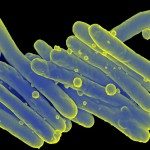Lien vers Pubmed [PMID] – 32778586
Lien DOI – 10.1073/pnas.2003235117
Proc. Natl. Acad. Sci. U.S.A. 2020 Aug; 117(34): 20848-20859
Tuberculosis (TB) claims 1.5 million lives per year. This situation is largely due to the low efficacy of the only licensed TB vaccine, Bacillus Calmette-Guérin (BCG) against pulmonary TB. The metabolic disease type 2 diabetes (T2D) is a risk factor for TB and the mechanisms underlying increased TB susceptibility in T2D are not well understood. Furthermore, it is unknown if new TB vaccines will provide protection in the context of T2D. Here we used a diet-induced murine model of T2D to investigate the underlying mechanisms of TB/T2D comorbidity and to evaluate the protective capacity of two experimental TB vaccines in comparison to conventional BCG. Our data reveal a distinct immune dysfunction that is associated with diminished recognition of mycobacterial antigens in T2D. More importantly, we provide compelling evidence that mucosal delivery of recombinant BCG strains expressing the Mycobacterium tuberculosis (Mtb) ESX-1 secretion system (BCG::RD1 and BCG::RD1 ESAT-6 ∆92-95) are safe and confer superior immunity against aerosol Mtb infection in the context of T2D. Our findings suggest that the remarkable anti-TB immunity by these recombinant BCG strains is achieved via augmenting the numbers and functional capacity of antigen presenting cells in the lungs of diabetic mice.

